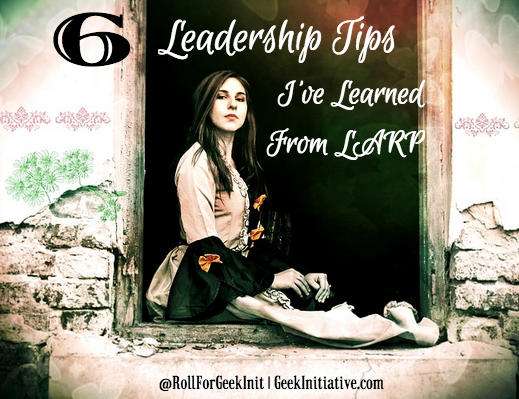LARP (live action role playing) helps me be a better leader in real life. In my favorite game, a monthly medieval fantasy campaign LARP, I consciously commit to role playing a character who remains loyal and becomes stronger and better at leadership.
This repeated practice (“I am strong. I am worthy of this position. I act with a loyal interest at all times”) has improved my real life leadership ability. In game, free of the consequences and challenges of real life, I am able to act on these thoughts and immersively internalize them, making me stronger, when I choose, after the game has ended.
Here are the six most important leadership tips I’ve learned from my experiences in LARP. I apply these to real life roles and relationships as needed, and overall I’m a lot happier with myself for having learned them. I hope they help you, too!
You Can’t Please Everyone
When you’re playing a leader, others seek your opinion and you have to make decisions and choices. Especially as a woman (and a female character who has done some rather typically feminine, ‘princessy’ things), I’m conditioned to constantly want to please others. I feel terrible when someone is displeased with my actions or decisions. I didn’t even realize how often I feel that way in real life until I started examining it in a LARP setting!
One of the hardest leadership lessons I’ve learned through LARP is also one of the most important: you can’t please everyone. You can only do your best and stay true to your cause.
I’ve noticed some indicators regarding others’ reactions to my character’s decisions:
- Outright disgust
- Immediate compliance (out of genuine trust, fear, or apathy)
- Displeased compliance / disagreeing behind the character’s back only / gossiping
- Public agreement and private disagreement with the character directly
- Disagreement with the course of action, but compliance anyway (“I don’t think this is the best thing to do, but I trust you to make the right decision for our people”)
The last of these is especially hard to earn and the most meaningful. My character has learned to pay close attention to the ones that say such things as well as those who will clue her in to what others are thinking but may be afraid to say. It isn’t always easy to get a barometer on what a particular group is thinking at any given time.
This has taught me to be much more observant of others’ feelings in real life.
Loyalty Means Everything
Once you declare you stand for something, you’d better hold to that. Remember this?
People remember the big stuff. I’ve learned that it’s really tough to make a declaration and then go back on it, even if you have new information and are willing to admit you misjudged someone. While that kind of thing did happen to my character, she stands with unquestionable loyalty in many ways. It’s left other characters with mixed feelings about her and that’s tough.
How does a sensitive, empathetic character live with herself in that situation? She knows she does the best she can and that she’s been true to the cause and the people she represents.
A Potentially Bad Decision Is Better Than Being Indecisive
You’re among your friends in a LARP, immersed and in game. It’s time for a decision to be made. Whether or not there is a clear hierarchy established, who do the individuals in the group look to?
When I am fully immersed in my favorite LARP and I see people look at me in these circumstances, it’s a lot of pressure in a brief moment. The last time this happened, I noted a variety of expressions: confusion, hurt, determination, longing, and helplessness about a choice that rested on my character. I took longer than I should have in making a big decision, but when I did make it, my answer was decisive.
Things could have ended poorly. Thankfully, they didn’t. In hindsight I feel like even making the wrong decision still would have been better than refusing to make one at all.
It’s Always Public Record
Public declarations, private letters, and even the most personal correspondence – all of these things are potentially public record. Being a leader (even in a medieval fantasy LARP) is like being a modern day politician with the Internet. Just about everything you say and do can potentially influence how others feel about you.
Know Your Weaknesses, Know Your Allies
One of the most important things I’ve learned from my character and her leadership style is to know my own weaknesses and always be aware of them. In the case of my character, there’s no point in hiding them, and some of her weaknesses are also her strengths (empathy, love for king). Once my character embraced her weaknesses, she started asking others for help. Those who accepted are now a real part of a mutual loyalty.
I probably would have lost my mind trying to run this website without a solid team. I can do everything it requires, but that doesn’t mean I should. And I’m certainly not the best at each and every one of those things. In this way, I’ve learned to delegate tasks to those I trust. I’m no Captain America, but I’m learning.
OOG (Out of Game) Does Matter
Your conduct out of game does matter. While there usually isn’t an out of game requirement, everyone appreciates someone who is friendly out of game.
Are you welcoming new players in your group and thanking them for attending on an out of game level?
This is a small gesture that doesn’t take much energy or time, and it potentially keeps people involved even when stuff gets dicey in game. I could be better about this, but I’m not the world’s best record-keeper. I do still try to Facebook friend the newcomers and welcome them into our forum threads and Facebook group. It’s also great to hear from people in advance out of game and then meet up with them right before the game starts. Even as an experienced LARPer, I know I feel a lot more comfortable at a game if I have met the players before.
Do you devote time to hearing your group’s concerns out of game between events?
Especially if your game doesn’t have a debriefing process, people may feel the need to talk about their experiences and seek out of game validation regarding their experiences. As an in game leader, you may end up being one of the people they check in with out of game. It’s helpful to the game and to individual players if you have time to listen. This is also an awesome way to make friends, obviously!
Do you devote time, money, or other resources out of game to create a sense of unity?
For me, this varies because my time and money vary. Examples include baking group-related food, composing and performing songs and poems related to the group, and creating / providing favors with a group symbol to make everyone feel included.
Some people also believe that it’s important to be ‘on the job’ out of game, i.e. always campaigning. I’ve been accused of doing this too much AND too little. It’s not something I will do if I start to feel stress or feel in game politics negatively affecting me in some way. That said, I do think how you conduct yourself out of game can’t help but affect how some people will feel towards you in game, even if just on a subconscious level.
Have you learned anything about leadership through a character’s actions in a LARP setting? Please let us know about it in the comments.





